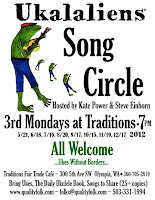“Make your work your play, and play your work” ~Sir
Chinmoy
“My story is about my interest in building things and my
interest in playing guitars merged… a talent and interest combined into one.”
~Bob Taylor
Anyone who knows me, knows that I have a deep passion for guitars,
and am willing to talk about—or read about-- any aspect of the instrument, and
the music it allows people to express. When I discovered this book written by
the person responsible for, what is now one of the most successful guitar
manufactures in the world, I was excited, and expecting to read about a guy and
his love of guitars.
Guitar Lessons is the story of Bob Taylor as much as it is the
story of the company, Taylor Guitars. At its heart it is a business book, but
that is only one of several themes carried throughout the pages of Taylor’s
autobiography. It is also an underdog story, describing how a small-time
builder of acoustic guitars was able to survive amid, and compete with industry
giants like Martin and Gibson. Among these and other themes, the one that
jumped off the pages to me was of a social nature; the way Bob, and his partner
Kurt Listug treated the people around them.
This theme could best be described as social sustainability.
According to Wikipedia, this concept encompasses human rights, labor rights,
and corporate governance while safeguarding future generations. It also
describes the philosophical aspect, which “…focuses on individuals’ behaviors, attitude
and actions.” As mentioned, this theme runs throughout the book. Some of the
more memorable examples that leap to mind are statements such as:
“I was blessed with the ability to be happy and content
with what I’d been able to achieve and I mean that in regard to every step of
my career” pg67
“We worked hard to clean up our act and become better
customers to our suppliers” pg91
“You are only as good as your employees” pg92
“The local government liked us because we followed their
laws and helped clean up their air” pg179
Taylor even included a chapter dedicated to the relationship
between employer / employee, Ch13, “We’re All In This Together.” The fact this is
considered a business book, one would expect it to address what is arguably the
most important aspect of a business—its people. What one may not expect is the
way Bob and Kurt (50/50 owners in Taylor) approached a brewing “us vs. them”
controversy in their factory. The two decided to invest three days away from
the factory and hired a consultant to address the problem; they asked, “What
would I want if I were an employee?” pg153. One of the things they discussed
was they didn’t know what it meant to be good employers, but they were willing
to find out. That willingness to honestly seek and acknowledge their
shortcomings along with their desire to do right by their employees speaks
volumes about their character.
On page 154 Bob writes, “You don’t have to give away profitability
of the business to garner trust & respect from employees you just have to
consider their needs, show solid leadership skills, and be fair and generous.”
They invested much time, effort, and money into this relationship to make the
employees feel part of the Taylor family; if you ever have a chance to visit the
factory, you’ll see that they have succeeded, and in a big way.
Of course being a guitar nut, it was also nice reading about advances Bob made in guitar manufacturing, such as the bolt-on neck; again challenging conventional ways of thinking. The traditional way of attaching the neck of an acoustic guitar to its body is by using a glued dovetail joint. Changes in humidity levels often cause a guitar neck to move out of alignment. Repairing this often requires removal of the neck. Doing so on a traditionally made guitar is very labor intensive. Taylor designed an alternative method of attaching the neck using bolts with a custom fit neck-pocket, making the process of removal much easier, and creating a straighter, more stable neck in the process.
 |
| Custom made, flamed Koa body/sides with detailed abalone inlays |
“…During the late hours of the night, when I am not
working on poems or when I’ve grown exhausted by my writing “voice,” I often
pick up my Taylor 710 dreadnought and find a quiet nook to carve out an intimate
bond with my guitar.” ~Ben Jackson















